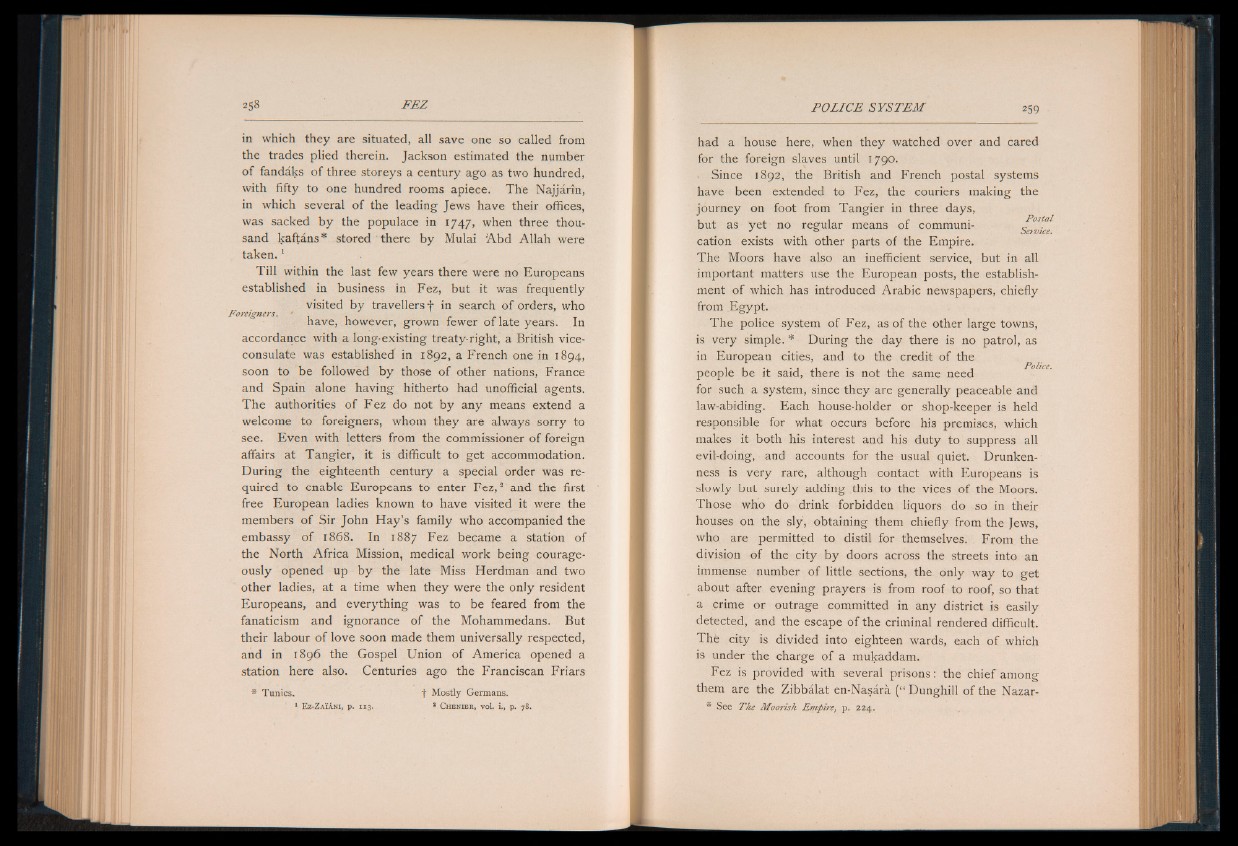
in which they are situated, all save one so called from
the trades plied therein. Jackson estimated the number
of fandaks of three storeys a century ago as two hundred,
with fifty to one hundred rooms apiece. The Najjarin,
in which several of the leading Jews have their offices,
was sacked by the populace in 1747, when three thousand
kaftans * stored there by Mulai Abd Allah were
taken.1
Till within the last few years there were no Europeans
established in business in Fez, but it was frequently
visited by travellers f in search of orders, who
Foreigners. . .
have, however, grown fewer o f late years. In
accordance with a long-existing treaty-right, a British viceconsulate
was established in 1892, a French one in 1894,
soon to be followed by those of other nations, France
and Spain alone having hitherto had unofficial agents.
The authorities of Fez do not by any means extend a
welcome to foreigners, whom they are always sorry to
see. Even with letters from the commissioner of foreign
affairs at Tangier, it is difficult to get accommodation.
During the eighteenth century a special order was required
to enable Europeans to enter F e z ,3 and the first
free European ladies known to have visited it were the
members of Sir John Hay’s family who accompanied the
embassy of 1868. In 1887 Fez became a station of
the North Africa Mission, medical work being courageously
opened up by the late Miss Herdman and two
other ladies, at a time when they were the only resident
Europeans, and everything was to be feared from the
fanaticism and ignorance of the Mohammedans. But
their labour of love soon made them universally respected,
and in 1896 the Gospel Union of America opened a
station here also. Centuries ago the Franciscan Friars
* Tunics. f Mostly Germans.
1 E z - Z a ia n i , p . 1 1 3 . 1 C h e n i e r , v o l. i., p . 78.
had a house here, when they watched over and cared
for the foreign slaves until 1790.
. Since 1892, the British and French postal systems
have been extended to Fez, the couriers making the
journey on foot from Tangier in three days,
1b ut. as uy et. no regul1 ar means 01r communi•- cP ost.ât J ° service.
cation exists with other parts of the Empire.
The Moors have also an inefficient service, but in all
important matters use the European posts, the establishment
of which has introduced Arabic newspapers, chiefly
from Egypt.
The police system of Fez, as of the other large towns,
is very simple. * During the day there is no patrol, as
in European cities, and to the credit of the
people be it said, there is not the same need
for such a system, since they are generally peaceable and
law-abiding. Each house-holder or shop-keeper is held
responsible for what occurs before his premises, which
makes it both his interest and his duty to suppress all
evil-doing, and accounts for the usual quiet. Drunkenness
is very rare, although contact with Europeans is
slowly but surely adding this to the vices of the Moors.
Those who do drink forbidden liquors do so in their
houses on the sly, obtaining them chiefly from the Jews,
who are permitted to distil for themselves. From the
division of the city by doors across the streets into an
immense number of little sections, the only way to get
about after evening prayers is from roof to roof, so that
a crime or outrage committed in any district is easily
detected, and the escape of the criminal rendered difficult.
The city is divided into eighteen wards, each of which
is under the charge of a mukaddam.
Fez is provided with several prisons : the chief among
them are the Zibbâlat en-Nasârà (“ Dunghill of the Nazar-
* See The Moorish Empire, p. 224.